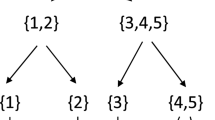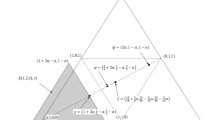Abstract
A cooperative venture yields a nonnegative surplus. Agents are differentiated by their opportunity costs only. Two surplus sharing methods (equal sharing, proportional sharing) are characterized with the help of four axioms. Separability and No Advantageous Reallocation deal with coalitional changes in the opportunity costs. Additivity and Path Independence take into account variations in the surplus level.Any triple of these axioms characterizes equalor proportional sharing. Any pair of axioms characterize a distinct, infinite family of methods, compromising between equal and proportional sharing.
Similar content being viewed by others
References
Aczel J (1966) Functional equations and their applications. Academic Press, New York
Aumann RJ, Maschler M (1985) Game theoretic analysis of a bankruptcy from the talmud. J Econ Theory 36:195–213
Banker R (1981) Equity considerations in traditional full-cost allocation practices: an axiomatic perspective. In: Moriarty S (ed) Joint Cost Allocations. University of Oklahoma, Norman
Chun Y (1985) The Proportional solution for rights problems. Forthcoming in Math Soc Sciences
Kolm S (1976) Unequal inequalities. Journal of Economic Theory 12:416–442
Mirman L, Taumann Y (1982) Demand compatible equitable cost sharing prices. Maths of Operations Research 7(1):40–56
Moulin H (1985) Egalitarianism and utilitarianism in quasi-linear bargaining. Econometrica 53(1):49–68
Moulin H (1985) The separability axiom and equal-sharing methods. J Econ Theory 36/1: 120–148
Moulin H (1985) Binary choices with compensations. Mimeo, University of California, San Diego
O'Neill B (1982) A problem of right arbitration in the talmud. Math Soc Sciences 2:345–371
Owen G (1982) Game theory, 2nd ed. Academic Press, New York
Peleg B (1986) On the reduced game property and its converse. Int J of Game Theory 15/3: 187–200
Peleg S (1985) An axiomatization of the core of cooperative games without side-payments. Mimeo, the Hebrew University of Jerusalem
Sobolev AI (1975) The characterization of the nucleolus by functional equations. In: Vorobiev NN (ed) Matematicheskie metodyv socialnix naukax. Vipusk 6:94–151
Young HP (1984) Consistency and optimality in taxation. Mimeo, University of Maryland
Young HP (1984) Taxation and bankruptcy. Mimeo, University of Maryland
Author information
Authors and Affiliations
Additional information
This research was supported under NSF Grant SES-8419465. Encouragements and criticisms from H. P. Young at an early stage of this research and detailed comments by C. Holt have been most precious. They are gratefully acknowledged.
Rights and permissions
About this article
Cite this article
Moulin, H. Equal or proportional division of a surplus, and other methods. Int J Game Theory 16, 161–186 (1987). https://doi.org/10.1007/BF01756289
Received:
Issue Date:
DOI: https://doi.org/10.1007/BF01756289




